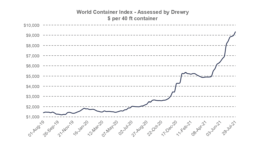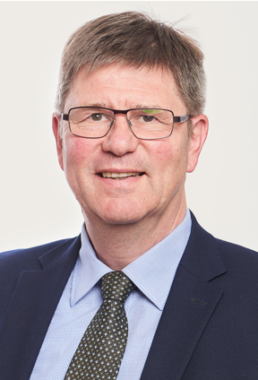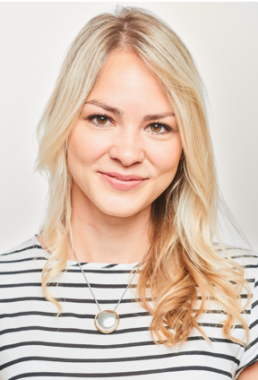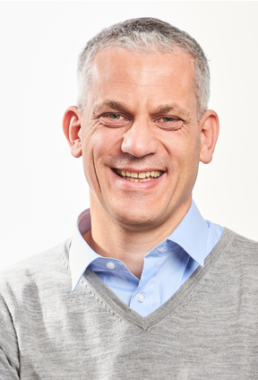Diving into the Digitalization of Maritime Logistics
The COVID-19 pandemic has undoubtedly posed significant challenges for supply chains globally. Multiple national lockdowns disrupted the transportation and logistics sector by slowing down or even stopping the flow of materials, finished goods, and people. Such changed market dynamics have also impacted companies in our portfolio which rapidly needed to adapt to new circumstances. The pandemic has indeed shed light on previously unseen vulnerabilities and even magnified problems that already existed in the transportation sector, especially in maritime logistics. While on a more positive note it offers an opportunity to re-evaluate the value chains to make them more resilient and sustainable, which makes it interesting (to MVP) for further exploration.
In 2020, almost 30% of companies reported major or severe delays in sea transport due to the COVID-19 pandemic disruption.
Due to ongoing severe disruption from the COVID-19 pandemic, the global supply chains have been reassessed and more focus has been put on local production and transport, which offered less disruption in times of crisis. This indeed brought a paradigm shift in maritime logistics which has by 2019 reached a total value of more than $14 trillion and has now focused on prioritizing resilience over efficiency. Moreover, higher risk management and resilience-building based on digitalization technologies have been put at the center of attention, especially with currently rocketing rates of freight containers due to ongoing disruption in global supply chains. Although digitalization and new developments in the field of AI, blockchain, IoT, SaaS, and automation have already emerged in the past decade as one of the main drivers of change in the maritime sector, the pandemic allowed smart technologies to be widely adopted and demonstrate their cost-effectiveness. To illustrate, in order to achieve greater efficiency of their operations almost 40% of maritime organizations have made data management a strategic priority. More, as a third of maritime organizations are seeing annual data growth of over 50%, data centralization, reduction of manual processes, and improved data quality have been ranked as top priorities for improving data management. Consequently, the pandemic underlined how important data and emergency-response technologies are for managing the transparency and predictability of supply chains. It became clear that the first movers are better able to navigate in times of high market disruption.
Due to ongoing disruption in supply chains, the level of the Drewry World Container Index is 368% higher than at the same time last year.
Many incumbents have already recognized the potential of the data analytics market holding a value prospection of $1,833.5M by 2027 and have set digitalization as one of the key strategies in order to safeguard the position of the market leaders. Maersk – one of the biggest shipping companies has been contracting and partnering with innovators to utilize vessel tracking and monitoring services and other applications for big data analytics. Moreover, corporations such as Siemens have started to offer digitalized shipping solutions that provide vessel operators and crew members with assistance in the decision-making process.
The main identified fields of application of data-based solutions are route & process optimization, smart port & port call synchronization, vessel optimization & fleet management, digital documentation, and environment monitoring which are more in detail presented in the following graphics.
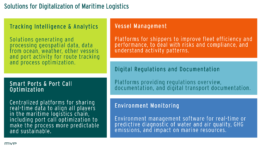
On the other hand, the start-ups market has also experienced significant growth of innovators, accompanied by dynamic investment and M&A activities. For instance, Spire Global, a space-to-cloud data analytics company, raised a total of $222.7M in funding, with European Investment Bank and Mitsui Global Investment being the most recent investors. It is a successful example of a company that is leveraging Satellite AIS services to provide weather, global shipping, and vessel tracking data. More, digital solutions can also play an important role in ports which are the main hub of maritime logistics, where cargo and different means of transportation are digitally connected and managed. Therefore, Port Call Optimization solutions such as Awake.AI can assist in improved decision-making and help the port operations to become more efficient, safe, and sustainable. Another example of a digital solution that sparks interest is a Digital Twin concept like software from We4Sea which uses real-world vessel data to create simulations that predict and improve vessel performance and fuel usage.
To provide a broader insight into the digitalization of the maritime sector, we are sharing with you a map of start-ups with the potential to pave the way toward more data-driven maritime logistics.
Maritime Logistics Digitalization Landscape
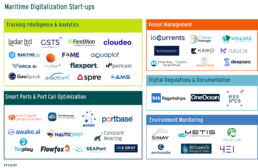
Ladar Ltd, GSTS, FleetMon, Cloudeo, MaritimeAI, HawkEye 360, FAME, Aquaplot, Orca-AI, Flexport, Portcast, GeoSpock, exactEarth, Spire, Autonomous Marine Systems, ioCurrents, OceanManager, we4sea, Winward, Kaiko Systems, Nautix, Digital Twin Marine, Smart Ship, DeepSea, Intelligent Cargo Systems, PortXchange, eYARD, Portbase, awake.ai, Nauticspot, Constant Bearing, Teqplay, Flowfox, SEAPort Solutions, Edray, Regs4ships, OneOcean, essDOCS, Sinay, METIS Cyberspace Technology, Green Sea Guard, Envirosuite, BiOceanOr, and 4EI.
As more than 90% of goods are at some point transported by ships, there is no doubt that the environmental footprint of maritime logistics also requires our attention. It is essential that the increased digitalization efforts not only contribute to the greater efficiency and robustness of the shipping sector but also provide solutions for managing sustainability issues such as ocean pollution, increasing GHG emissions, biodiversity loss, and resources depletion. Besides alternative fuels and sustainable energy storage, digital solutions will be key to meet the International Maritime Organization’s (IMO) commitment to reduce the total annual GHG emissions from international shipping by at least 50% by 2050, compared to 2008.
Maritime transport is responsible for about 2.5% of global GHG emissions; however, a lack of mitigation action can lead to a significant increase.
An interesting example of such a company that is successfully combining digitalization with sustainability is a French start-up Sinay, which provides a vertical SaaS for managing data related to operations and environmental impacts for the maritime sector. It sets an example of how efficient operations can go hand-in-hand with the GHG emissions reduction potential and increased sustainable use of maritime resources. As a such, it is aligned with our focus on partnering up with start-ups that have the potential to transform value chains as well as drive change towards decarbonization and climate protection. Which other start-ups do you know that fulfill these requirements?
Let us know what you think about the future of the digitalization of maritime logistics and how it can help to achieve greater sustainability impact in the sector.
The start-ups driving Circular Fashion in Europe
Paris-based sustainable fashion company Vestiaire Collective just announced to have reached unicorn status in its new €178 million round, making it the latest European start-up to join the exclusive club. The second-hand fashion marketplace has experienced rapid growth over the last three years and has already made its way into the United States and Asia Pacific markets. The growth was certainly accelerated to some degree by the pandemic which favored digital solutions. But more importantly, Vesitaire Collective was early to capture on the material and deep-rooted shift in consumer interest towards sustainability. And this is not limited to buying and selling pre-owned clothing: especially younger consumers are increasingly aware of the environmental and social impacts of the fashion industry, demanding among others more sustainable and longer lasting products and better end-of-life solutions.
Indeed, we can’t neglect that the fashion industry has a broader sustainability issue: already before the pandemic, the equivalent of one garbage truck of textiles was landfilled or burned globally every second. This has likely increased further over the past months as shops are closed and unsold clothing piles up in fashion and textile warehouses. Furthermore, less than 1% of products are recycled into new garments and despite efforts by some players 12% of fiber is lost in production (Source). Not to forget that in some production facilities, garment workers toil 16 hours per day earning a fifth of the minimum wage required for a decent life.
10% of global carbon emissions are calculated to stem from fashion today. This could increase to up to 25% in 2050.
On a positive note, there are already several companies who strive to move the fashion industry away from the take-make-waste thinking towards circular strategies which respect all three pillars of the Triple Top Line: economic growth, environmental impact, and social equality. (Read more about the Triple Top Line idea here). Accenture estimates that circularity holds an economic value potential of $30-90 billion for the fashion industry. Indeed, it could become the biggest disruptor to the industry over the next decade.
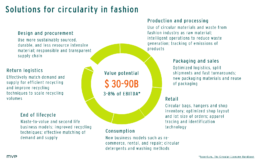
At MVP, our focus is on partnering up with start-ups that have the potential to transform value chains and drive change in the most CO2 intensive and pollutive industries. And we see that alongside Vesitaire Collective, an entire ecosystem of start-ups has emerged in Europe that have this potential. They are developing bio-degradable raw materials, bringing transparency to the supply chain, enhancing the lifetime of clothes with rental or second-hand platforms, or recapturing raw materials from non-reusable products.
To provide an insight on our view of the industry, we want to share this (non-exhaustive) map of European Circular Fashion start-ups. It includes companies in very early development stages as well as more established players that have already raised significant amounts of funding. We want it to be a source of inspiration, collaboration, and a starting point for discussions.
Let us know what you think about the landscape and who is missing.
Circular Fashion Landscape
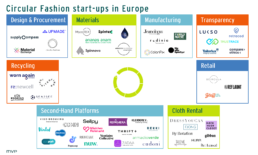
SupplyCompass, Upmade, Material Exchange, circular.fashion, MycoTEX, Spintex, Pili, ananas anam, Spinnova, Amadou Leather, Jeanologia, Fairly Made, rodinia, Colorifix, We aRe SpinDye, Lukso, retraced, TrusTrace, Tailorlux, Compare Ethics, Sircula, Reflaunt, Stuffstr, DressYouCan, Fjong, Hackyourcloset, By Rotation, gibbon, Hurr, Videdressing, vinted, momox, Swapush, Popswap, Sellpy, Mädchenflohmarkt, Rebelle, nuw, Vestiare Collective, Repamera, Thrift+, Zadaa, Kleiderly, REKKI, armadioverde, cudoni, Worn Again, Renewcell, Infinited Fiber, Eoe Regrind, and Sea2see.
________________________________________
Julian is Investment Associate at Munich Venture Partners. While he is not a fashion specialist nor known for an outstanding dressing style, he has great interest in the field of Circular Economy and sustainable consumption in general. With this lens, he looks at different industries and sectors. Feel free to contact him via LinkedIn.
asgoodasnew secures new funding
Berlin, December, 11 2020
asgoodasnew, the Berlin-based European re-commerce leader specialising in high-tech consumer electronics, has announced a new financing round led by Northern European specialist growth investor Verdane. Exisiting investors Munich Venture Partners, Brandenburg Capital, and pd ventures also participated in the round.
The investment will support asgoodasnew’s successful business development and further international expansion, drawing on Verdane’s extensive knowledge of the European re-commerce space and experience from over 30 previous e-commerce investments. To date, asgoodasnew has helped over 1,000,000 customers throughout Europe to impact their ecological footprint by finding a new home for their preloved gadgets or helping them purchase a fully tested, refurbished device. Powered by this change in consumers’ perception and behaviour, asgoodasnew’s revenues have grown by more than 150% over the past 5 years.
Daniel Boldin, CEO of asgoodasnew said: “With Verdane onboard, we will strengthen our pioneering position in European consumer electronics re-commerce as the preferred supplier for high-tech gadgets, tested and reconditioned in Germany. The take, make and dispose model for consumer electronics is going to perish. There is a huge and environmentally impactful business opportunity in enabling consumers to extend the lifecycle of their beloved high-tech gadgets. asgoodasnew’s success shows that it is possible to combine a circular business model with double-digit profitable growth and high capital efficiency.”
Founded in 2008, asgoodasnew operates in Germany, Austria, France, Spain, Italy and Poland. According to the company’s calculations, each of its more than one million reconditioned and resold iPhones, laptops, tablets, cameras, smartwatches and wifi speakers sold save up to 50kgs of CO2 compared to new production of a corresponding gadget, tallying to a total potential CO2 savings impact of 50,000 tonnes of CO2 to date. By partnering with Verdane, the company aims to offer more customers a smart and affordable way to impact their individual ecological footprint.
The company’s integrated consumer-to-business-to-consumer (C2B2C) business model covers the entire value chain of the re-commerce market from sourcing and testing to refurbishment and distribution, delivering a strong value proposition with high customer retention rates and independence from third parties. A popular feature is its comprehensive 30-month warranty, offered on all products since 2014 as a testament to asgoodasnew’s extensive technical know-how, and pioneered by the company since then on multiple European markets. Building on its early understanding of the need for a more sustainable approach for consumer electronics consumption and driven by short customer usage cycles resulting from frequent new product releases, asgoodasnew has emerged as a European leader for refurbished premium consumer electronics.
Maroje Guertl, Principal at Verdane said:“We are proud to reaffirm Verdane’s commitment to a more resource-efficient future for the European consumer by welcoming asgoodasnew into the Verdane portfolio. Daniel and his team have done an excellent job of building asgoodasnew into a clear leader in its sector with a strong position from which it can develop into a substantially larger European market leader. There is natural complementarity with Verdane’s deep knowledge of the European re-commerce space from prior investments, and we are proud to partner with asgoodasnew on this journey toward circularity for the high-tech consumer electronics market.”
Thomas Krause, Chairman of the Advisory Board and Managing Director at Brandenburg Kapital, added: “On behalf of the board, we are very pleased to announce this partnership with Verdane as we set out to accelerate the successful European expansion of the company. We believe we have found the ideal growth partner to help realise our joint vision of asgoodasnew’s future together with Daniel and his team.”
End
Prolupin extends its growth financing round
The European Circular Bioeconomy Fund (ECBF) is a new pan-European fund that invests in growth companies in the bioeconomy and circular bioeconomy with equity and mezzanine financings. The ECBF is backed by the European Investment Bank (EIB) as the cornerstone investor and by Hauck & Aufhäuser Fund Services S.A. administered in Luxembourg. Backed by the European Investment Bank (EIB) and managed by Hauck & Aufhäuser Fund Services S.A. in Luxembourg, ECBF is the first growth-fund fund exclusively dedicated to the bioeconomy in Europe that focus on catalyzes sustainable innovations.
Since the launch of its vegan brand Made with LUVE in 2015, Prolupin has enjoyed exceptional annual growth. The new financing now enables the company to address the mass market for further growth and international expansion.
In addition to the existing investors, Munich Venture Partners and eCAPITAL, the renowned investors Capricorn Partners and Novax have already participated in the financing round in spring.
The Capricorn Partners, Novax, and ECBF investment brings a broad mix of technology expertise and trade network resources to Prolupin as it seeks to grow its plant-based offerings from lupines both B2B and B2C, including the non-dairy yoghurts, milks, ice creams and cream cheeses on the European market under the vegan Made with LUVE brand.
“The ECBF funding will make an important contribution to accelerate the growth of Prolupin within B2B and B2C. The research & development, marketing and distribution we are now able to deploy over the coming years will put our unique Lupine Protein Isolate (LPI) as well as the vegan Made with LUVE brand center stage for customers and consumers aiming for a healthy, sustainable ingredient and lifestyle.”
Malte Stampe (CEO, Prolupin GmbH)
Reiner Kuester, Chairman of the Supervisory Board of Prolupin, stressed: “We are pleased to welcome the ECBF and the expertise it brings to the Advisory Board. With its international network and its focus on sustainability, the ECBF can significantly contribute to strengthening Prolupin’s position as a strong player in the fast-growing market of plant-based foods.
Michael Brandkamp, Managing Partners at ECBF, says: ” Prolupin is a fast-growing plant-based protein company with its successfully established dairy-alternatives brand made with LUVE. The growth in consumer demand for healthier food with a reduced environmental footprint will be long-lasting. With its lupine-based protein Prolupin is well positioned to capture a significant share in this market and to contribute to making our societies more sustainable.”
The investment bank Bryan, Garnier & Co was appointed as exclusive financial advisor for the transaction.

What's "driving the eco-industrial revolution" about?
Climate change has entered a new phase. Alarming signals of an ever more rapid change in the biosphere are increasing. And scientists highlight that earth may have already passed several climate change tipping points which has irreversible effects, such as the loss of the Amazon rainforest and the great ice sheets of Antarctica and Greenland. At the same time, it is becoming a decisive political factor with hundreds of thousands of young people pioneering a new extra-parliamentary climate opposition.
…it’s about decoupling economic growth from environmental pollution
As the world’s population is rising to over 9 billion people in 2050, countries of the South and the East are becoming increasingly industrialized, and cities continue to grow, global economic output will roughly double in the next 30 years. Over the same period, greenhouse gas (GHG) emissions will have to fall dramatically in order to reach the GHG reduction targets set by governments. For the EU, the binding target is a cut by at least 40% compared to 1990 levels by 2030. This puts a great burden on the economy. However, the question is not whether the global economy will continue to grow. The key question is whether we can decouple value creation from environmental pollution.
The recipe is nothing less than a new industrial revolution with an impact similar to the invention of the steam engine, industrial steal making, or the automobile: the eco-industrial revolution.
In essence, it is about a threefold transformation of the old industrial society: firstly, a complete shift from fossil energy sources to renewable energies; secondly, a continuous increase in resource efficiency to generate more value from fewer raw materials and energy; and thirdly, the transition to a circular economy in which the productivity of resources is increased.
…it’s about fostering the transformative power of technology
Similar as the first industrial revolution was triggered by the invention of the stream engine, also the eco-industrial revolution will be driven by technological innovations and their expansion. However, this time, we require technologies that allow a rethinking of existing value chains to reduce CO2 emissions along the entire process of value creation.
At MVP, we call such technologies that (I) improve, (II) enhance, or (III) reconstruct existing value chains Transformative Technologies. They trigger fundamental changes and paradigm shifts in existing business areas in short time frames. To some degree, Transformative Technologies can also be viewed as disruptive. However, rather than the disruptive “destroy and build new” approach, Transformative Technologies may also enable developing new enhanced solutions using existing infrastructure whenever possible. They are the basis for shaping the future and have an extraordinary growth potential. Identifying these opportunities and financing appropriate technologies and solutions is one of the strategic cornerstones of MVP’s Venture Capital investment approach.

…it’s about leveraging total value potential
Our focus is on driving change in the most CO2 intensive sectors and financing businesses that can have a huge impact in achieving decarbonization of the incumbent industry. To make it clear: it’s not about limiting economic growth in favor of ecological sustainability. We are firmly convinced that economic growth and ecological sustainability are not tradeoffs, but in contrast mutually reinforcing factors. With investments in companies like sonnen we were able to verify this thesis in the past. Even more, companies and business models, which do not take into account ecological responsibility, will not be successful anymore or disappear completely.
Therefore, we integrate the concept of Triple Top Line value creation in our investment strategy to leverage the full transformative potential of a technology. Rather than balancing economical, ecological and societal targets, this approach focuses on employing their dynamic interplay to generate value. (Read more about our Triple Top Line strategy here)
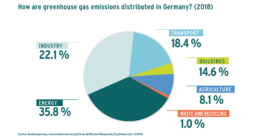
Driving the industrial revolution is the core philosophy of our investment approach. In fact, that’s what we’ve been doing at MVP for over 15 years now. With this experience and the capital entrusted to us, we back pioneering entrepreneurs and become sparring partners for ambitious teams to create the business leaders of tomorrow.

